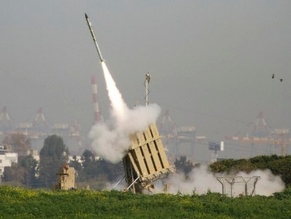|
World Jewish News

An Iron Dome anti-rocket battery in action, March 11, 2012. Photo by: AP
|
Top official: Israel gave no guarantees in exchange for Gaza truce
14.03.2012, Israel After four days of hostilities that subjected much of southern Israel to rocket fire from Gaza, Egyptian mediators managed to arrange a cease-fire on Tuesday. But the cease-fire was broken by four rockets and seven mortar shells fired at Israel in the hours after it took effect at 1 A.M.
Nevertheless, the Israel Defense Forces refrained from aerial attacks on the Gaza Strip on Tuesday, and in general, relative quiet prevailed.
When compared to previous rounds of hostilities between Israel and the Palestinian terrorist organizations in Gaza, the cease-fire took hold relatively quickly this time. That is an indication that neither Hamas, which has overall control of the Strip, nor Israel really wished to prolong the latest clash.
Sources in Gaza reported that three Palestinians were injured by IDF fire while throwing stones at Israeli observation posts on the Gaza border, near Khan Yunis, following the funerals of Islamic Jihad militants.
Altogether, about 300 rockets were fired into Israel during the recent hostilities. Of these, 56 were intercepted by the Iron Dome anti-missile system. Since Iron Dome only targets a fraction of the missiles fired - namely, those deemed likely to land in populated areas - that represents a success rate of over 70 percent.
IDF Chief of Staff Benny Gantz said yesterday that 26 Palestinians were killed in the course of the recent confrontation, of whom 22 were terrorists and four were civilians.
The restoration of relative calm was achieved following two days of indirect negotiations between Israel and the Palestinian factions. Egyptian intelligence officials spoke separately with the heads of Hamas, Islamic Jihad and the Popular Resistance Committees. On the Israeli side, the talks with the Egyptians were run by the head of the Defense Ministry's political department, Maj. Gen. (res.) Amos Gilad, and the head of the IDF's plans and policy directorate, Maj. Gen. Amir Eshel.
Gilad told Haaretz yesterday that the understandings reached were "very simple - quiet in exchange for quiet." He said the understandings were not spelled out in a signed document, and the only Israeli commitment was that if the Palestinian organizations refrained from launching attacks on Israel, the IDF would also hold its fire.
At first, at the Palestinians' request, the Egyptians also attempted to obtain an Israeli commitment to refrain from targeted killings of senior figures in the various terrorist organizations. But Israeli officials said this effort was shelved in the face of Israeli opposition. "There were no guarantees and no other promises," said Gilad, denying Islamic Jihad's claim that Israel did in fact promise to refrain from targeted killings of the organization's operatives.
"Major credit goes to the Egyptians for the successful effort they invested in obtaining a cease-fire," Gilad added.
But other Israeli officials commented that some time elapsed before Cairo intervened in the events in Gaza. They attributed this to the delicate situation the Egyptians has been in since the fall of the Mubarak regime, and especially now, given the upcoming elections in Egypt.
What are your thoughts on this issue? Visit Haaretz.com on Facebook and share your views.
Taking stock
With the hostilities having ended, at least until the next time, both sides are now examining their gains and losses. As usual, the bottom line is a little different from what the leaders are telling both themselves and their publics.
There is no doubt that Israel's military preparedness, both offensively and on the home front, showed improvement compared to prior rounds of fighting. It is also the case that despite its massive rocket fire, Islamic Jihad didn't manage to kill any Israelis, mainly thanks to the Iron Dome system.
But with regard to the state of Israeli deterrence, the answers are less clear-cut. It is true that the smaller factions in Gaza, which paid a nonnegligible price in casualties over the past several days, will think hard before undertaking another offensive.
Nevertheless, the latest round began with a targeted killing by the IDF aimed at foiling a Palestinian terror attack via Sinai. This poses the question of whether Israel's political leadership will lightly approve a similar operation next time it receives an intelligence warning, now that it knows the price may well be hundreds of rockets fired at civilians and the paralysis of nearly a million residents of the south.
Moreover, while the response provided by Iron Dome is sufficient to cope with the relatively limited challenge posed by Gaza, adding Hezbollah in Lebanon to the equation adds another 50,000 rockets and missiles. Four Iron Dome batteries (assuming the fourth becomes available at the end of the month as planned) provide only a very partial answer to this threat.
By Amos Harel and Avi Issacharoff
Haaretz.com
|
|
